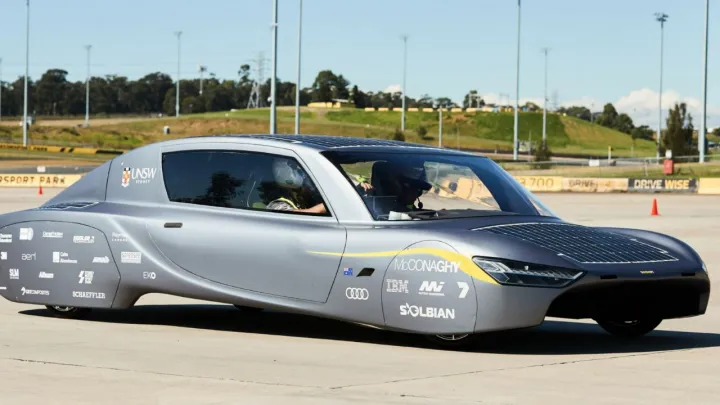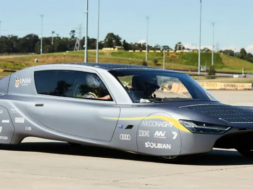
UNSW has been tinkering with solar powered car technology for a long time now and is ready to shoot for another world record with the Solarswift 7.
Previous generations of the UNSW Sunswift solar powered car have been record breakers. In 2014, the Sunswift 5 (eVe) broke the FIA world record for the fastest electric vehicle capable of travelling 500km on a single battery, averaging a speed of 107km/h. A big part of this is its solar technology, however 500km is pretty notable for an electric car.
The sixth car, the Solarswift VIolet, broke another record in 2016, setting a Guinness World Record for the lowest energy consumption while driving across Australia in an electric car.
Six years on and the UNSW engineering team is ready to break another record with the next generation solar power racer: The Solarswift 7 (that name freakin’ rules by the way).
The challenge: setting the Guinness World Record for the fastest solar electric car over 1,000km. The team is hoping to achieve a speed of 120km/h for the entire distance. 1,000km is far beyond the range of consumer-ready electric vehicles in Australia, with the Tesla Model S Plaid+ capable of about 837km on a single charge.
“This is the result of the hard work of 50 undergraduate students who are very dedicated, very focused and very talented,” said Richard Hopkins. He’s the Sunswift team principal and used to be the head of operations for the Red Bull F1 racing team.
“They were given the freedom to create. The criteria was simply: build a car that has solar power and a battery. I had very little influence over what they chose to do within that – I just wanted them to make the best engineering decisions.”
The Sunswift 7 looks like nothing you’ve probably seen before, engineered to break records instead of meeting the commercial, private use requirements of Teslas or Polestars.
It was meant to begin racing in 2021 in events such as the World Solar Challenge, but COVID kind of messed up the schedule.
“Let’s remember, these are not the best paid professional car makers in Stuttgart working for Mercedes. This is a bunch of very smart amateurs who have taken all the ingredients and put it together in a brilliant way,” added Hopkins.
“Sunswift 7 is the manifestation of their collective minds, who on day one probably had very little idea what they were doing. And now to produce this amazing car is just insane.”
The car weighs 500kg, well below what you’d typically expect from a car you might see on the road. It took 57 attempts to get the design right. It has no ABS, no air conditioning, no windscreen wipers and no airbags.
The team claims that it can travel more than 1,200km on a single charge of battery.
“We are using a standard battery and a standard solar panel, but we have focused on making it a super-efficient car and shown what is possible,” Hopkins continued.
“Very little rolling resistance and very little air resistance are what makes this car so efficient. And when you have an efficient car, you don’t need a lot of battery to make the whole car work.
“With the Guinness World Record, if we can prove that we can drive a car at reasonably high speed and do 1000km, it proves the technology exists. We just need to do some polishing with that technology to make it mainstream.”
The Sunswift 7 will also be fitted with 5G sensors and cameras, capable of being driven without somebody in the car (this has been handled by the team’s technical partner, Optus). Chaz Mostert, the winner of the 2021 Bathurst 1,000, will be taking the car for a spin around Mount Panorama in October, while outside of the cabin.
UNSW is also launching the “Sunswift Institute” to bring racing, automotive development and technological innovation into one cohort.
The team will attempt the world record in December.














